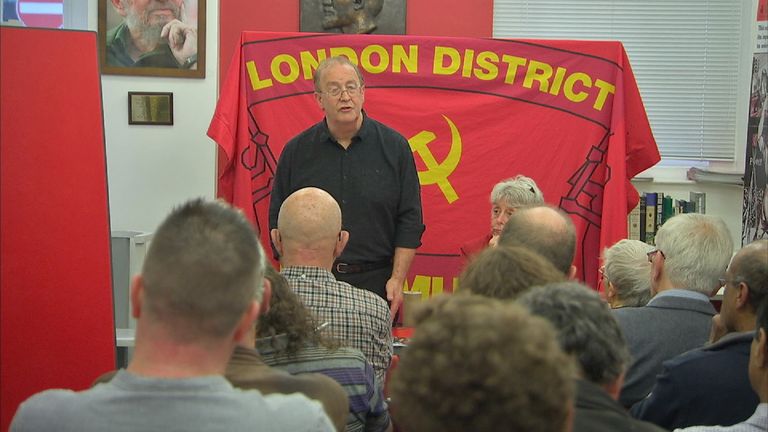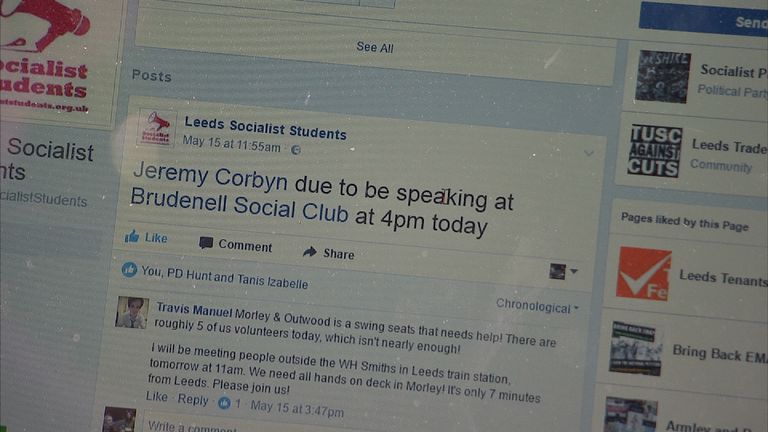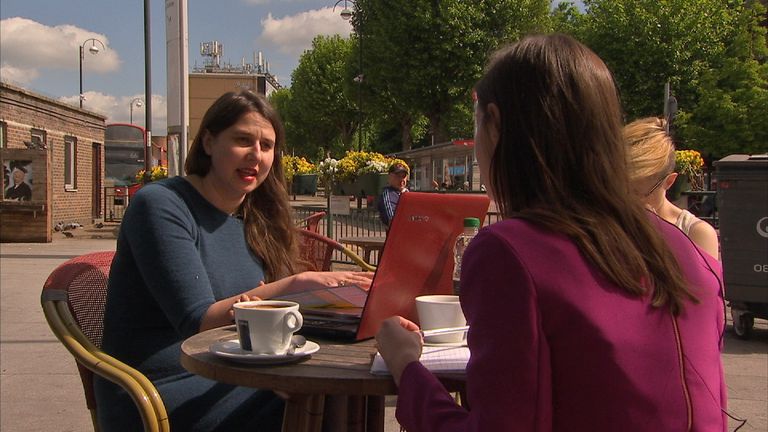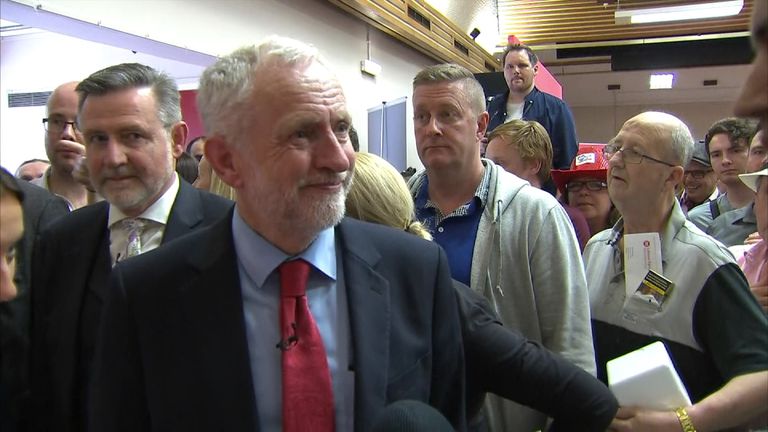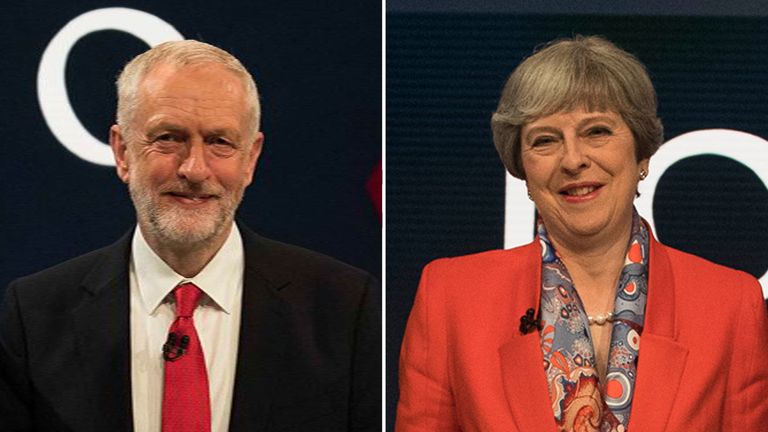Can far-left fringe parties make a difference to Labour's election push?
Far-left groups are trying to help Labour by not fielding candidates, but the party says their support is "utterly marginal".
Friday 2 June 2017 06:57, UK
They are firmly on the fringes of politics, but far-left parties are switching allegiance to support Jeremy Corbyn - who was of course not long ago on the fringes himself.
With the polls narrowing and UKIP and the Green Party getting squeezed by the Tories and Labour respectively, can Britain's smallest parties wield any influence?
Some are standing no candidates in this General Election for the first time, in order to drum up any support they can for a Labour Party whose principles they railed against back in 2015 as little different from the Conservatives.
Activists told Sky News they have been working to turn out the crowds for the Labour leader's rallies - alongside party members - by sending out hundreds of social media messages.
They also hope to boost a slate of Corbyn-supporting candidates in the hope that whatever happens on June 8, he has allies in a future leadership battle and a chance to drive forward the left-wing agenda.
Britain's largest far-left party, the Trade Union Socialist Coalition (TUSC), founded by the late Bob Crow, is standing no candidates this year.
They fielded 135 in 2015, triggering a row with Labour's backers in the Unite union.
It's all changed now. Chair Dave Nellist - a former Labour MP thrown out in 1991 as a member of Militant, said they embraced policies such as renationalising the railways and reversing spending cuts.
"He's a socialist and we want him in Number 10," he said.
They won only 2,000 votes per seat at the last election, but by shifting campaign and financial resources to Labour they hope to boost turnout where it might count.
Mr Nellist said: "There were nine seats the Tories won in 2015 which gave them their Parliamentary majority, where the total majority across those nine seats was 1,600 votes.
"One in Derby was only 40 votes. So dozens of votes can make a difference, never mind hundreds or thousands."
What will they push for in return? What sounds to many in the party like entryism.
He was denied re-entry into the party last year, but said: "It's not a blank cheque. I think Jeremy should welcome socialists from trade unions coming back into the Labour Party to strengthen support for the current manifesto and make the debate stronger."
A spokesman for the group claimed the presence of left-wing student activists helped explain which seats Mr Corbyn was campaigning in, certainly in the early weeks of his campaign.
Certainly, the Labour leader has campaigned in a number of seats with big Labour majorities, as well as fairly safe Tory constituencies - rather than key marginals the party would be expected to target.
Clare Laker-Mansfield, national organiser for Socialist students said its branches helped spread the word about the Labour leader's appearances via Facebook and WhatsApp - intending to reach thousands of supporters.
Its members joined a 4,000-strong crowd in Leeds and several hundred in Leamington Spa, near Warwick University.
Ms Laker-Mansfield, who once stood for the Socialist party against Labour, said: "As soon as we heard that there was a Corbyn rally in Leeds, we put it up on our official Facebook page and it started a chain reaction.
"Our members would start to post information on their now Facebook pages and we use WhatsApp and text trees. That helped to get as many people as possible and there was a big crowd in the end."
She added: "We want to use this as an opportunity to build a movement.
"It's partly about changing the outcome of the election and getting Corbyn into power. But it's also about what's going to come next because from our point of view the civil war in the Labour Party is not going to end on the 8 June, and we need to mobilise people to support Corbyn."
Fellow ex-Militant leader Derek Hatton will be supporting Mr Corbyn, despite criticising him for voting to trigger Article 50.
He said the support from parties outside the Labour fold was unprecedented.
"There have always been certain MPs over the years who have attracted support from the left but never on a national scale like this", he said.
The Communist Party of Britain hit the headlines when they announced they would stand no candidates in this election - the first time since their party was founded in 1920.
The party has not had an MP since the 1940s, but one of their former members, Andrew Murray, who only left the party in December - a longstanding ally, is now working on Mr Corbyn's election team.
"We've given him a free transfer", said Robert Griffiths, the party's general secretary.
He said since the party's committee or "politburo" took the decision to back Labour last month, local communist parties across Britain had approached their local Labour parties offering help with campaigning.
"In quite a few cases those have been welcomed and we have assisted in a practical way. I don't think they would thank me for telling you who they are, but it's well-known locally," he said, meeting Sky News at the Marx Memorial Library in London.
A victory for Labour, in his view, would be "a great step forward for the people of Britain, the working class of Britain especially."
A Labour Party source said the impact of far-left parties was "utterly marginal" adding: "We have a mass membership of half a million and a hugely energetic activist base campaigning across the country on a huge scale and that's what's significant."
But as Mr Corbyn's campaign gains strength, enthusing young voters and winning back wavering Labour supporters as well as Greens and Liberal Democrats, his supporters further to the left hope to play their small part.

